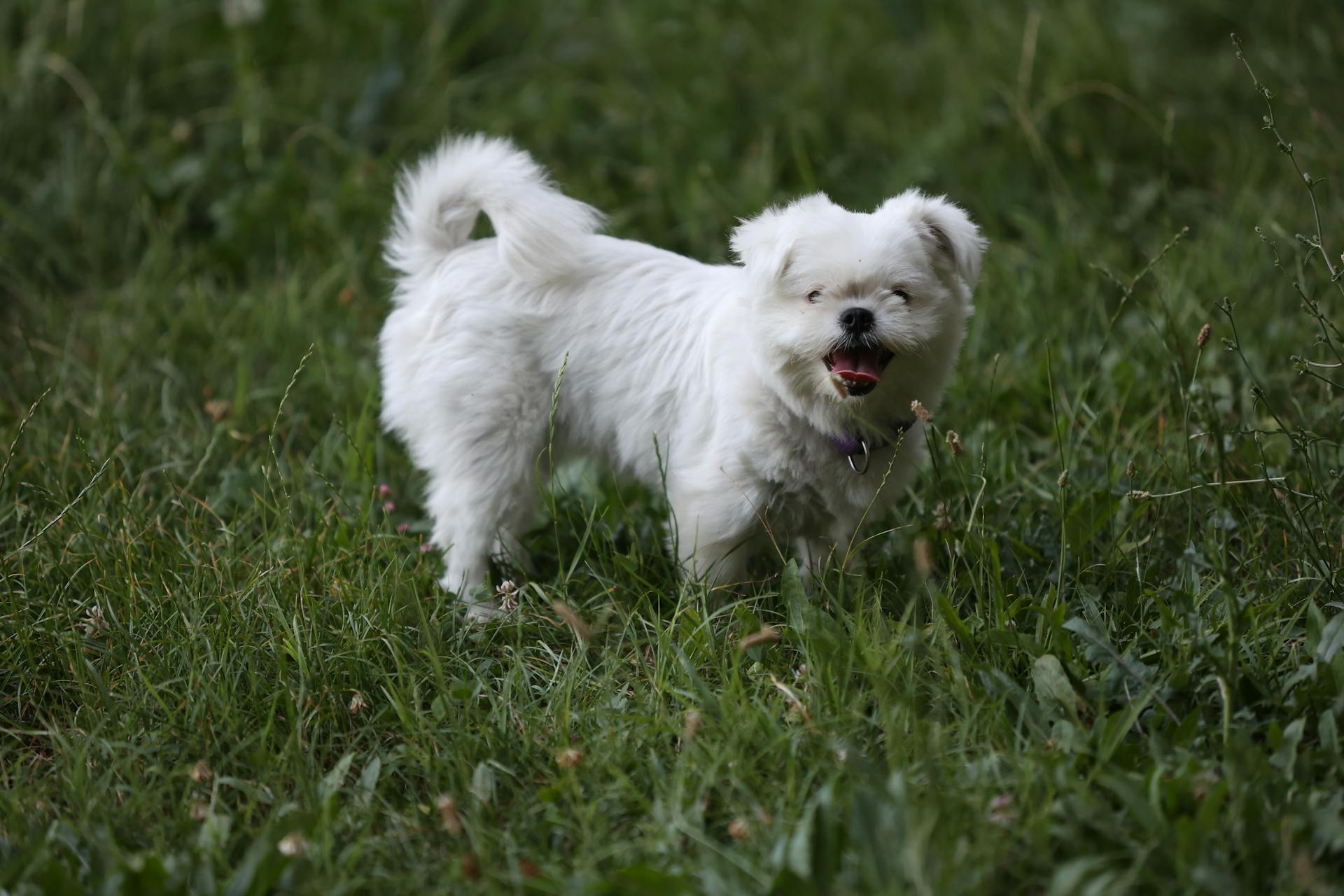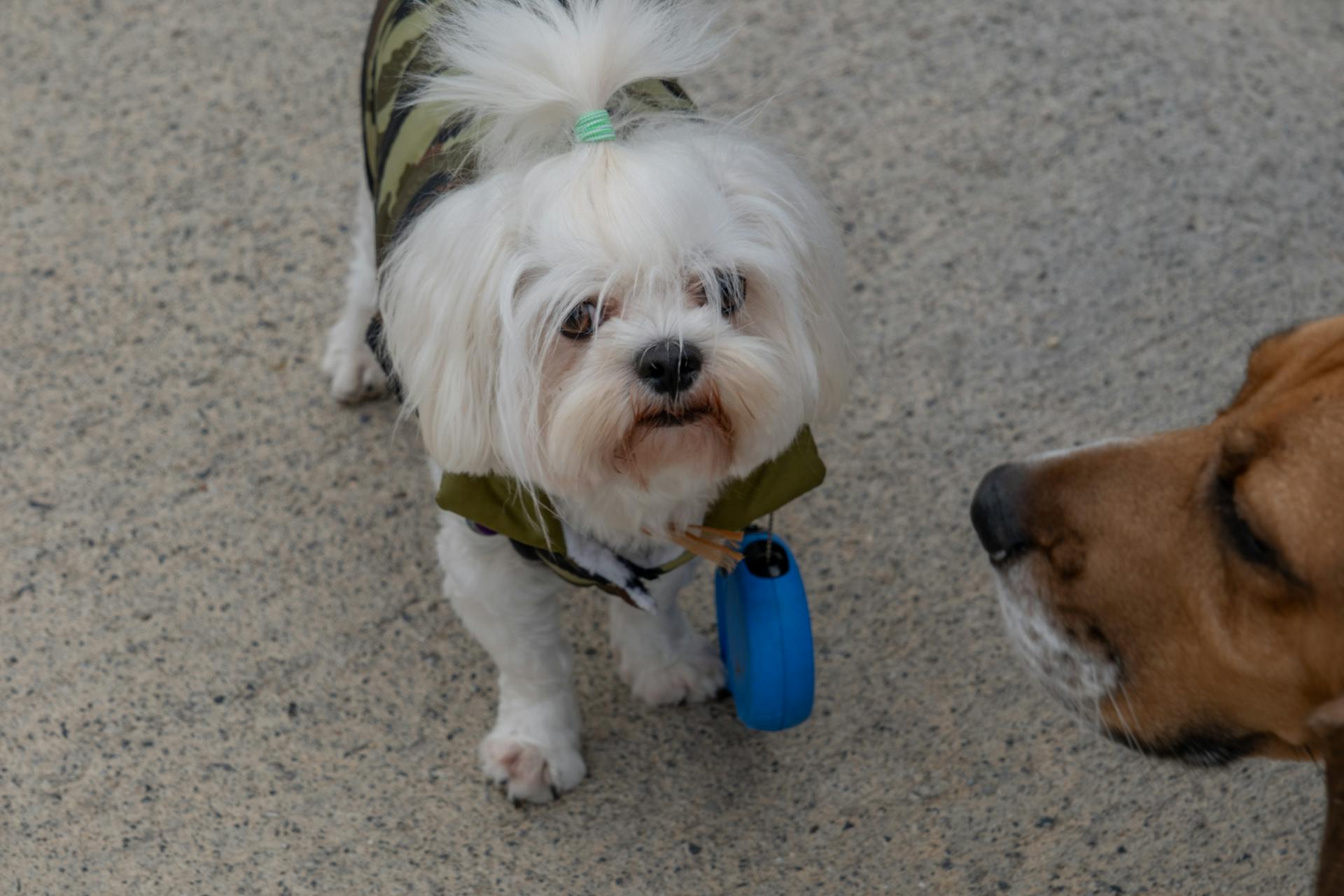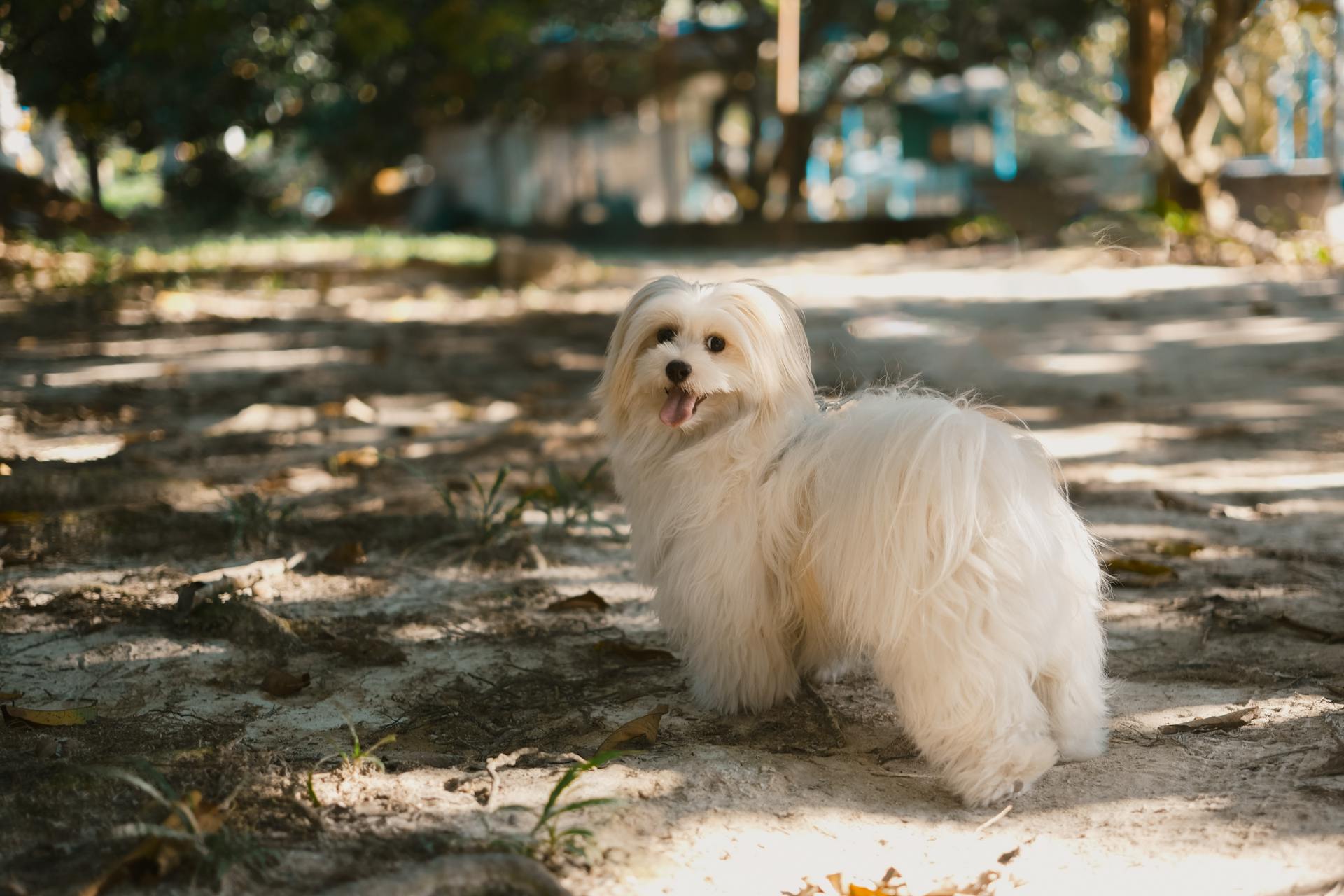
If you're considering bringing home a Maltese-like dog, you'll want to know the basics of their care and health needs. The Bichon Frise, for example, requires regular grooming to prevent matting and tangling of their coat.
Bichon Frises are playful and gentle dogs that thrive on human interaction, but they can be wary of strangers. They need early socialization to become confident and calm in new situations.
Their small size makes them a great choice for apartment living, but they still need daily exercise to stay happy and healthy. A short walk or playtime in a securely fenced area should suffice.
Physical Characteristics
The Maltese is a small dog breed with a compact body, typically reaching 7-10 inches in height and weighing between 3-10 pounds. Their well-proportioned body makes them a delight to behold.
Their small, floppy ears add to their adorable appearance, and their black-button nose and dark eyes give them a sweet expression. A tufted tail curved over the back completes their charming look.
The silky white coat is the Maltese's most distinctive feature, growing to cover their short limbs and giving them a floating appearance. Their fur is hypoallergenic, making them a great choice for people with allergies.
Maltese dogs come in three different fur color combinations, although their coat is usually pure white with a pale ivory tinge or light brown spotting permitted.
You might like: Do Maltese Dogs Have Hair or Fur
Temperament and Personality
The Maltese is a tiny dog breed with a big personality. They are happy to cavort with people of all ages and sizes.
Maltese dogs are very intelligent, social, and trusting. They are often friendly with other dogs and pets.
They thrive on human interaction and can become anxious or lonely if left without attention. The members of this breed love to be held and cuddled.
The Maltese is a natural watchdog, alert to anything suspicious. Despite their petite build, they're quite fearless.
Maltese dogs are curious, energetic, and playful, and they generally enjoy learning tricks. They're excellent therapy dogs due to their affectionate nature.
The Maltese is fairly easy to train, but they may bark more than needed as a watchdog. They're an ineffective protection dog, but make great companions for older gentle children and the elderly.
Care and Upkeep
The Maltese is a playful breed that requires regular exercise, but its energetic needs can be met in a small yard or apartment with leashed walks for mental stimulation. They prefer temperate weather and can get stressed in extreme temperatures.
The Maltese's long white coat requires regular grooming to prevent tangling and matting. Daily brushing and combing are necessary, and regular baths and conditioning can help keep their coat soft and looking good.
Maltese nails grow fast and need regular trimming. Pet owners should also check their dog's ears every week and remove any wax, debris, or excess hair.
The Maltese's small size makes them vulnerable to larger dogs and wild predators, so owners must be vigilant to protect them. Household hazards like heavy items that could fall on the dog should also be removed.
Frequent grooming can help prevent secondary health issues that arise from matted hair. Regular grooming also helps prevent skin irritation and keeps their coat looking its best.
You might enjoy: Why Do Dogs like Looking Out the Window?
Health and Nutrition
Dogs like Maltese require a balanced diet to maintain their overall health.
Maltese dogs are prone to dental issues, so regular brushing of their teeth is essential.
Their small size means they don't need a lot of food, but they do need high-quality food that meets their nutritional needs.
A healthy Maltese can live up to 12-15 years with proper care and nutrition.
Common Health Problems
Maltese dogs are generally quite healthy, but they're prone to several hereditary conditions.
One of the common issues is patellar luxation, a weakened kneecap that can slip out of place. This can cause pain and discomfort for your furry friend.
Legge-Calve-Perthes Disease (LCPD) is another concern, affecting the hips of Maltese puppies. It's essential to keep an eye out for any signs of hip problems.
White dog shaker syndrome is a condition that affects small white breeds, including Maltese. It manifests as generalized body and head tremors, which can be caused by an autoimmune issue.

Patent Ductus Arteriosus (PDA) is a congenital heart disease that can occur when a blood vessel near the heart doesn't completely close after birth. This can lead to heart failure if left untreated.
Maltese are also prone to ear infections due to their hanging triangle-shaped ears. A lack of air circulation and more hair present in the ear canal can make them more susceptible to infections.
Regular dental cleaning is crucial for Maltese dogs to prevent dental issues. This can include regular check-ups with your veterinarian to ensure your pet's teeth are healthy.
Some of the common health problems in Maltese dogs include:
- Patellar luxation
- Legge-Calve-Perthes Disease (LCPD)
- White dog shaker syndrome
- Patent Ductus Arteriosus (PDA)
- Ear infections
- Dental issues
Diet and Nutrition
When you're deciding on the right diet for your Maltese, it's essential to keep in mind that they don't need a large caloric intake, so a total of 1/4 to 1/2 cup of dry dog food distributed into two meals per day is a good starting point.
Suggestion: Shiba Inu Reach 1 Cent

These tiny dogs can be picky eaters, so it's crucial to avoid giving them human food and table scraps to prevent weight gain.
Fresh, clean water should always be available for your Maltese, and if you have any questions about their diet, be sure to contact your vet for guidance.
If you notice your Maltese has a sensitive digestive system, you may need to adjust their diet accordingly, but in general, sticking to a consistent feeding schedule is key.
Life Span
The Maltese breed has a good life span in comparison to many other breeds, with an average life expectancy of 13.5 years, ranging from 12 to 15 years old.
Females usually live about a year longer than males, which is a notable difference to consider. With proper care, your Maltese can live longer than the average lifespan.
On average, a Maltese can live up to 15 or more years, making them a long-term companion.
Explore further: Shih Tzu 100 Years Ago
Training and Exercise
The Maltese is a strong little dog who is perfectly able and willing to walk along with his owner on daily outings. They enjoy their daily walks, where they can explore, sniff, meet and greet, and exercise.
Maltese are very intelligent and typically learn tricks easily. Consistency is very important with their training, as they can be skilled at finding ways to manipulate their owners into giving them what they want. They can also be somewhat stubborn, but they generally respond well to positive training.
Daily walks or some playtime in the backyard (or even indoors) should be enough to keep them happy and in good shape. Maltese are very energetic, but they only need occasional exercise. Housetraining can be a challenge, but patience and persistence is key to successful housetraining of this breed.
Frequently Asked Questions
What dog breed is similar to a Maltese?
The Havanese dog breed shares similarities with the Maltese, boasting a silky coat and outgoing personality. Known for forming strong bonds with owners, the Havanese is a loyal companion.
What is the friendliest small dog?
The Pomeranian is often considered the friendliest small dog breed, known for its affectionate and gentle nature. However, other small breeds like the Bichon Frise and Maltese are also highly regarded for their friendly and adaptable personalities.
Is a malshi a good dog?
Yes, Malshis can make great family pets due to their affectionate and intelligent nature. They're perfect for families who can provide constant companionship and attention.
Featured Images: pexels.com


